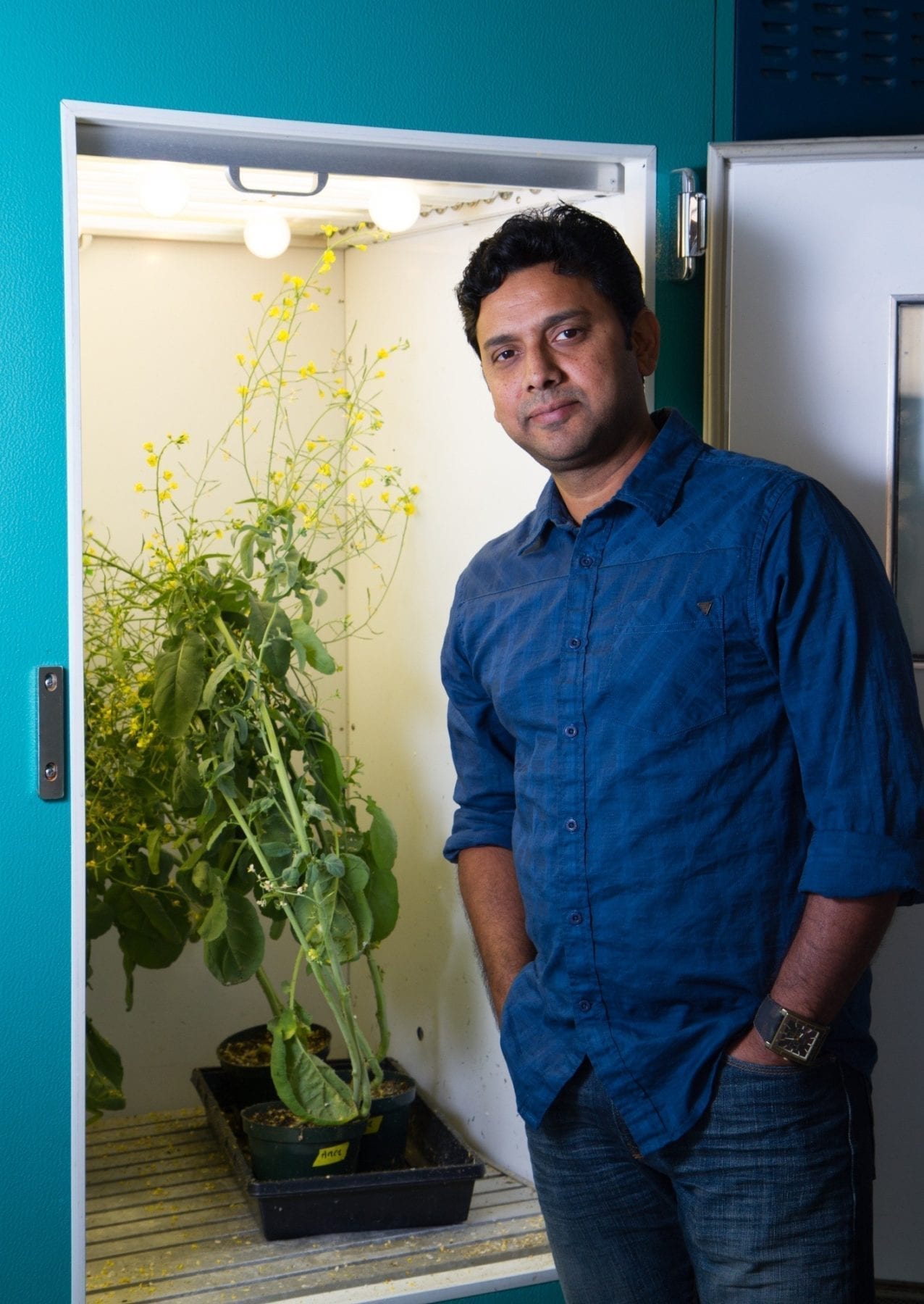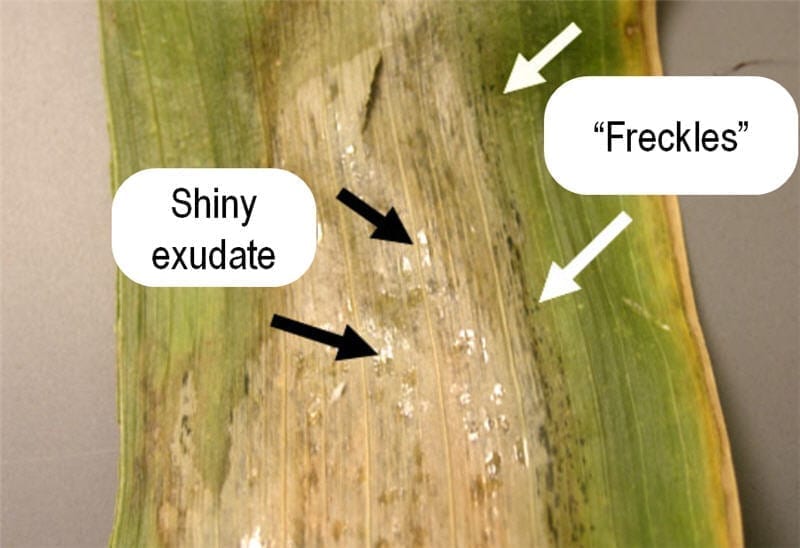
Research team uncovers gene regulatory network that controls seed ‘de-greening’
A genetic discovery by a University of Calgary-led international research team offers a solution to a longstanding “green seed problem” that causes millions of dollars annually in canola crop losses.
Led by Marcus Samuel in the Faculty of Science, researchers from the University of Calgary, the University of Toronto and the University of Bordeaux in France, have uncovered a plant gene regulatory network that could be genetically enhanced to prevent green seeds from occurring in mature canola.
“The annual loss in North America alone is close to $150 million from this de-greening issue,” says Samuel, assistant professor and chair of the plant biology program in the Department of Biological Sciences. “I want to see this basic science translated into a viable application. Canola is a huge cash crop and we have a real solution to a major problem.”
The team’s research was just published in the Proceedings of the National Academy of Sciences of the United States of America, a top-ranked journal. The article, “ABI3 controls embryo degreening through Mendel’s I locus,” includes five years of work by U of C faculty and students.
Canola is the major cash crop in Alberta. The province produces about 35 per cent of Canada’s canola. Across the country, the oilseed crop, whose seeds are pressed into canola oil, contributes about $15 billion a year to the Canadian economy.
The problem: Green colour ‘fixed’ by frost
Every year around the time when canola matures, an unpredictable touch of a light frost can damage crop quality and cause severe losses.
“The frost doesn’t kill off the plant, but it ‘fixes’ the green colour in the seeds,” Samuel explains. “Non-lethal” frosts, occurring at temperatures of zero to minus a degree or two Celsius, can result in up to 20 per cent green seeds – as opposed to mature brown or black seeds – in mature canola, he says.
This presence of chlorophyll (pigment that imparts green colour to plants) in mature seeds affects the oil quality, produces unpleasant flavours and odours, and reduces the oil’s shelf life.
De-greening process investigated in close relative to canola
The research team investigated the de-greening process in a weed species called Arabidopsis, a “model” research plant whose complete genetic makeup is known and which is a close genetic relative of canola.
The research team, using a “mutant” strain of Arabidopsis that produces mature green seeds, performed genetic analyses that uncovered a pathway required for seed development and removal of unwanted chlorophyll during seed maturation.
They found that a protein that regulates gene expression (how the gene’s information is used in synthesizing a functional gene product), called ABI3, is important in removing seed chlorophyll and enabling the seeds to de-green.
In an illustration of how basic science builds upon itself, the researchers identified that ABI3 regulated expression of a gene mapped in 2007 as controlling chlorophyll degradation and resulting in yellow versus green seed colour. This colour difference was first identified as a trait in the 1800s by genetics pioneer Gregor Johann Mendel, who used it as a marker to study the inheritance of traits.
The team also showed that a higher expression of ABI3 in Arabidopsis led to seeds that were able to de-green normally to produce mature brown-black seeds, despite harsh cold treatments. “This overexpression allows these plants to withstand cold much better and for the system to be functional even though it’s hit with cold,” Samuel notes.
The goal: Create varieties that can withstand freezing
“Given the similarity of Arabidopsis and canola, it would be easy to isolate the same genes from canola and use transgenic technologies (which introduce new genes into organisms) to create varieties that could withstand freezing conditions, yet produce mature brown-black seeds,” he says. “We actually have demonstrated in our laboratory tests that the canola genes work the same way.”
The Latest Bing News on:
Canola crop
- Feedgrain Focus: Traded volume lifts in southon May 8, 2024 at 9:17 pm
Wheat, barley and sorghum prices are little changed from last week, with volume surging in the south as traders sell warehoused stock, in contrast to the thinly traded north...Read More ...
- North American grain/oilseed review: Canola weakens Wednesdayon May 8, 2024 at 6:43 pm
The ICE Futures canola market was weaker on Wednesday, with profit-taking after recent gains behind some of the selling pressure. Widespread Prairie rains contributed to the declines as drought ...
- ICE canola weekly outlook: Uptrend intact, but watching weatheron May 8, 2024 at 1:44 pm
ICE Futures canola contracts climbed to their highest levels of 2024 in early May before taking a step back on May 8. While the uptrend is still intact, improving moisture conditions across Western ...
- Heat is coming for our crops. We have to make them readyon May 8, 2024 at 1:10 pm
Humans and animals can hide from extreme heat. But plants have no escape. To protect our crops from the heat to come will likely mean modifying them.
- Manitoba Issues Weekly Crop Reporton May 8, 2024 at 1:03 pm
Seeding progress across Manitoba has been delayed with recent rains and currently sits at approximately 4% of the acres being seeded. Producers have begun seeding spring wheat, barley, oats, and corn.
- New crop-spraying technologies are more efficient than everon May 8, 2024 at 9:18 am
Dyson first used this technique to treat wheat, and is now spraying other crops including oilseed rape (known as canola in America), maize and potatoes. The company reckons it is seeing a reduction of ...
- Global meta-analysis quantifies benefits of cover crop useon May 7, 2024 at 11:43 am
For years, both scientists and farmers have debated whether the use of cover crops—plants used to cover the ground after harvesting of main crops—have a positive or negative impact on subsequent crop ...
- False Facts About Canola Oil You Thought Were Trueon May 5, 2024 at 8:30 am
Looking to switch up the oil you're using? We're here to debunk some of the myths about canola oil and separate fact from fiction.
- Growers opt out of canolaon May 2, 2024 at 12:30 am
Grain Producers Australia chairman and Miling, Western Australia farmer Barry Large said it was so dry that people were opting out of canola. He said growers had returned canola seed to the ...
- Building a better canola with broccolion May 1, 2024 at 11:55 am
Canola is Manitoba’s biggest crop by cash receipts. At $2.37 billion in 2022, it brought the most dollar-value of any agricultural product.
The Latest Google Headlines on:
Canola crop
[google_news title=”” keyword=”Canola crop” num_posts=”10″ blurb_length=”0″ show_thumb=”left”]
The Latest Bing News on:
Green seed problem
- Renegade Plastics closes pre-Seed investment led by Schneider Resources Holding.on May 8, 2024 at 7:59 am
Renegade Plastics®, a leader in making coated fabrics more sustainable, is excited to announce closing a pre-Seed investment led by Schneider Resources Holding. The investment will help expand ...
- Our View: Seed, plant exchanges share much wisdomon May 8, 2024 at 1:45 am
As we stuff our Opinion section with commentaries of the day – our own editorial pages inside news pages crowded with noteworthy stories – the particulars about seed exchanges are often sidelined as ...
- RMG export industry: The fashion problem and the sustainability solutionon May 6, 2024 at 11:06 pm
We need to alter and align our manufacturing techniques and raw materials sourcing in such a way that the final garment, when thrown into a compostable bin, biodegrades in 60 days. That would truly be ...
- ‘Aggressive, insidious and volatile’: Invasive grass causing problems, putting other plants at riskon May 6, 2024 at 10:57 am
JACKSON COUNTY, Miss. ( WLOX /Gray News) - An invasive grass species is causing problems and putting native plant life at risk. In Florida, Louisiana, Texas, Mississippi, Georgia, South Carolina, ...
- Gardening tips 2024 — Top tip for keeping your grass green all summer plus £6 B&M purchase to transform gardenon May 5, 2024 at 10:38 pm
A GARDENING expert has shared a top tip to help you keep your lawn looking green throughout summer. Steven Bell, owner of Paving Shopper, says it’s crucial to kickstart your lawn care early ...
- 6 plants gardening experts say you should never grow from seed – and what to do insteadon April 26, 2024 at 11:00 pm
For example, if you're tending to your herb garden for spring and summer, you're better off growing rosemary from cuttings rather than beginning the entire process from seed – but more on that later.
- Draymond Green On Battle For 10th Seed: "I Don't Give A Damn About The Rockets"on March 24, 2024 at 8:55 pm
it's poetic for this battle for the No. 10 seed to come down to these franchises. The Warriors have a ton of problems plaguing their roster at this point, with Draymond Green calling his own team ...
- Want a lush lawn? Here’s when to plant grass seed in spring for the best resultson February 23, 2024 at 7:10 am
To foster grass growth, water new seeds often and wait to mow your lawn until they’ve developed a strong root system. Growing a vibrant green lawn ... Look for problem areas with thin coverage ...
- ACS Project SEED Programon November 16, 2023 at 4:13 am
On April 4, 1968 the ACS Council passed a resolution “to take the appropriate steps to ease the problems of underprivileged segments ... From this, Project SEED (originally “Summer Experiences for the ...
- Best Feminized Seeds: Potent + Easiest Feminized Cannabis Strains To Grow in 2024on August 6, 2022 at 12:00 am
Green Crack doesn’t need much attention, which is why it’s one of the best female weed seeds for beginners ... and a wide array of body ache problems. Strawberry Diesel has an average ...
The Latest Google Headlines on:
Green seed problem
[google_news title=”” keyword=”green seed problem” num_posts=”10″ blurb_length=”0″ show_thumb=”left”]










